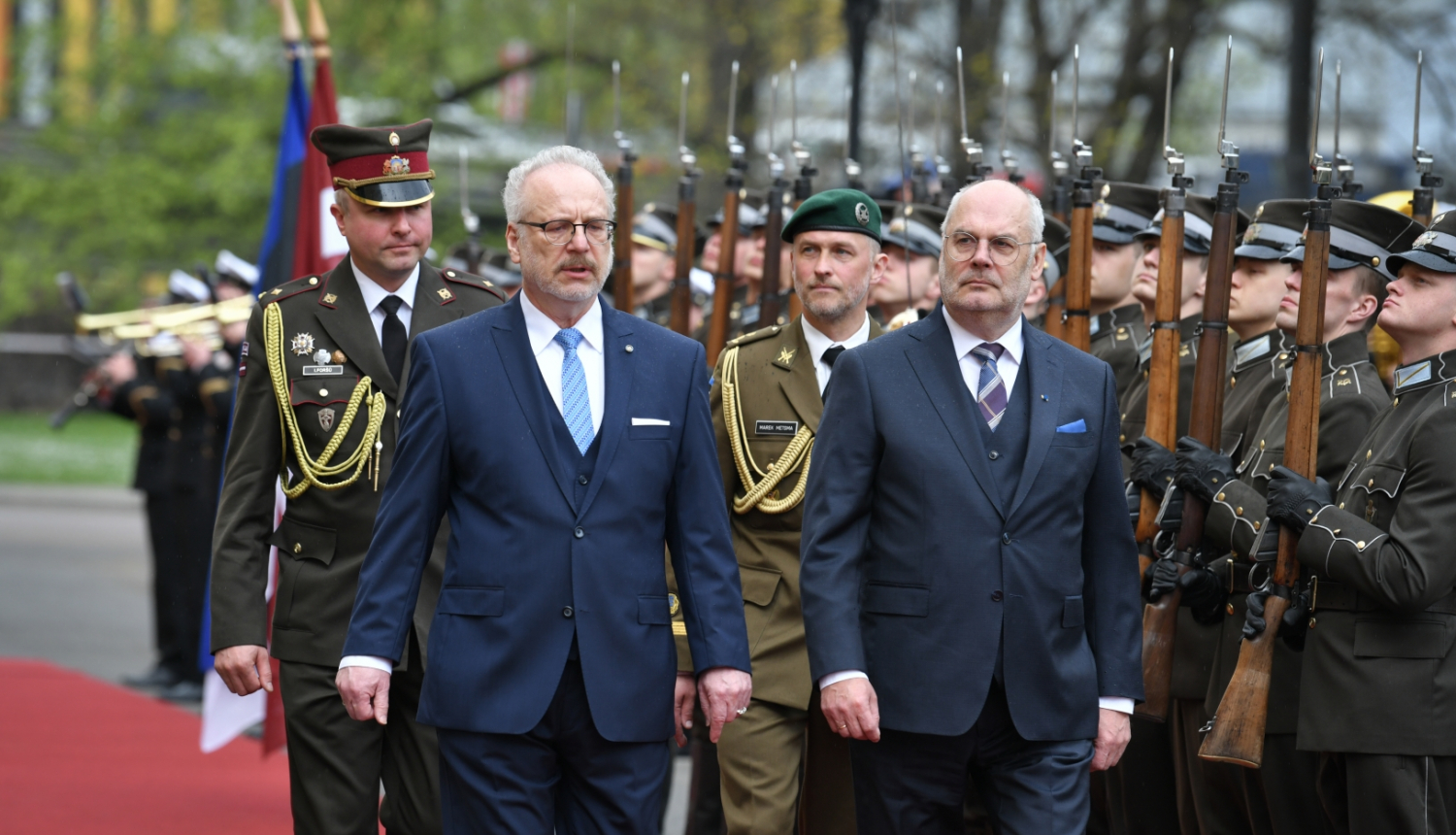On 24 April, His Excellency the President of Estonia Mr Alar Karis and his spouse Mrs Sirje Karis paid a state visit to Latvia. After the meeting at the Riga Castle, the presidents of Latvia and Estonia made statements to the media.

On 24 April, His Excellency the President of Estonia Mr Alar Karis and his spouse Mrs Sirje Karis paid a state visit to Latvia. After the meeting at the Riga Castle, the presidents of Latvia and Estonia made statements to the media.
I am delighted to welcome President of Estonia and Mrs Karis on a state visit to Latvia. President Karis has, of course, visited Latvia many, many times, but so far these have always been working visits. A state visit is something special. It gives us the opportunity to look in depth at our long history of cooperation in various sectors and to set our future goals.
Estonia is our closest neighbour, together with Lithuania, with many parallels in history and similar challenges today.
President Karis and I discussed the current security situation in the region and preparations for the forthcoming NATO Summit in Vilnius in July this year. Our main common priority is to make progress in implementing the Madrid Summit decisions on strengthening NATO's Eastern flank before the Vilnius Summit. This is particularly linked to the reinforced presence of our NATO allies in the Baltic States.
Finland's accession to NATO is a very important step towards strengthening the region and the entire NATO alliance. Finland has completely reversed its position of almost 70 years and has gone from being a neutral country to a NATO member. This is good for Finland, good for our region and good for NATO as a whole. I am sure that Sweden will also join NATO soon.
We also support the prospect of Ukraine joining NATO. We therefore welcome NATO Secretary General Stoltenberg's recent statement that Ukraine belongs in NATO and that there is broad consensus on this.
President Karis and I both agree that concrete, measurable progress is needed on this issue at the NATO Summit in Vilnius. It is no longer enough to say that 'NATO's door is open', which has been the case for 15 years. We need to have a concrete road map on how Ukraine will be able to join NATO.
At the same time, we must invest in strengthening our own countries' security. In Latvia, we are working to increase our national defence spending to 2.5% by 2025 and to 3% of GDP by 2027. Therefore, I am also very pleased that the new Estonian government has announced that Estonia will increase its defence spending to 3% of GDP.
Latvia and Estonia are the world's biggest supporters of Ukraine in terms of GDP - this shows how seriously we take Russia's war against an independent and democratic country - Ukraine - and how seriously we take this security situation.
It also demonstrates our clear commitment to international law. That is why we also stand together for the creation of a special international tribunal to hold Russia accountable for its aggression against Ukraine.
I believe that the optimal model for a tribunal would be a real, international tribunal under the auspices of the United Nations. However, other options should not be automatically ruled out. Here we need to work a lot together with the so-called Global South countries, which have perhaps not yet expressed their position clear on this issue. We must make it clear to all countries in the world that international law is the basis for world peace. This does not apply only to Europe, but to the whole world. And here Estonia's experience as a member of the UN Security Council will be very important, which we will of course use on our way to the Security Council in the 2025 elections.
Strengthening infrastructure is the basis of our countries' economic growth and security. That is why we also discussed the common big projects and tasks of the Baltic States.
One of them is the implementation of the Rail Baltica project as soon as possible. Energy security and independence, renewable energy resources and projects are also very important. One of the pillars of future energy will be the construction of the Elwind wind park, a joint project of Estonia and Latvia in the sea off the Latvian coast.
Latvia and Estonia share close economic ties. Estonia is Latvia's second largest foreign trade partner and second largest investor.
We also have various joint projects in the digital field. We also discussed the issue of e-health. I believe that we should take Estonia's experience into account, because our e-health project has not been so successful.
Tomorrow, the Latvian-Estonian business seminar, which will also be attended by the Minister of Economy, will discuss these and other projects. I am confident that this seminar will foster even closer cooperation between our entrepreneurs and will bring results.
Finally, I would like to note the close cultural ties between our two nations. We have access to Estonian literature, which we read in Latvian. Estonians have access to Latvian literature, which they read in Estonian. There is cooperation in cinematography and other areas. We get to know each other better through cultural cooperation. And that is how it should be between neighbours.
I would also like to mention that this year in Latvia is the Year of Livonian heritage. The Livonian language is closely related to Estonian. Of course, we are aware of and strengthen the Finno-Ugric roots of our nations.
Mr President, thank you again for this visit! It is a clear confirmation of the at least 600 years of historical friendship and solidarity between our two nations.